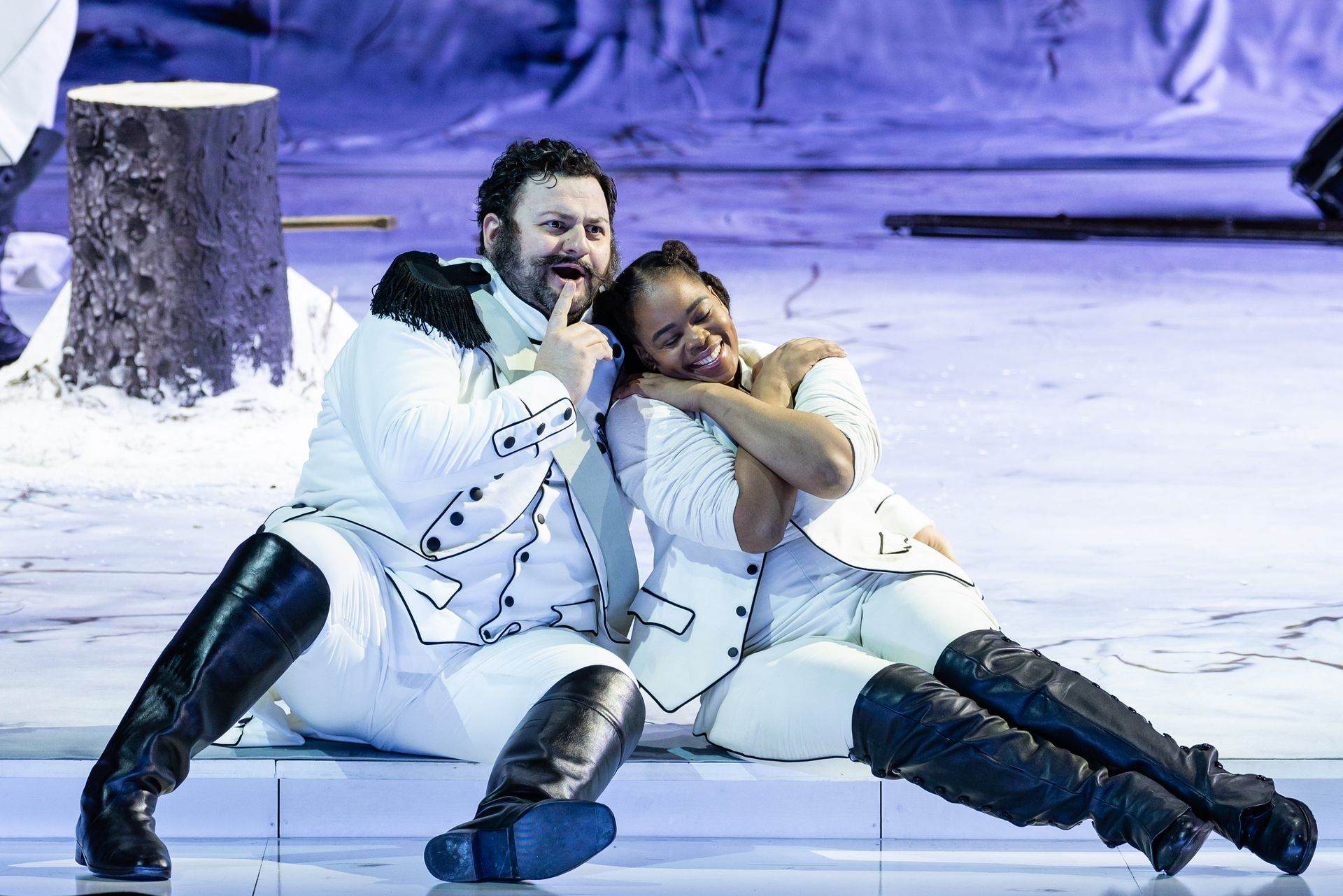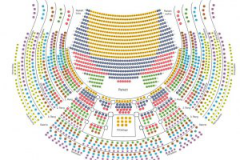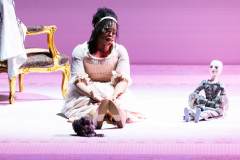The Daughter of the Regiment
November 2025 | ||||||
|---|---|---|---|---|---|---|
Mo | Tu | We | Th | Fr | Sa | Su |
Composer Gaetano Donizetti. Libretto by Jules-Henri Vernoy de Saint-Georges and Jean-François Bayard.
recommended from 13 years
Opéra comique in 2 acts (1840)
A co-production with Teatro San Carlo, Naples
In French and German language. With German and English surtitles. New Production.
Duration est. 2 hours 30 minutes
La Fille du régiment, or the “regiment’s daughter”, is what they call the young Marie, who was found when just a child on the battlefield by soldiers. The troops commit to raising the evidently abandoned girl themselves. A young man of course must soon enter the scene and stir a special interest in her, and the secret of her origins will soon also be revealed. In the best tradition of French opéra comique, with his team of librettists, Gaetano Donizetti created a piece that in a truly original way combines Alpine idyll, patriotic enthusiasm and romantic love with comic situations and heightened conflicts. While Donizetti’s piece was at times extremely popular, the “regiment’s daughter” faded from favour somewhat in the 20th century. It can now be rediscovered, from the famous overture right through to the both amusing and cryptic music, in its first new production at the Bayerische Staatsoper in almost ninety years
Damiano Michieletto places the question of true identity front and centre in his staging. “The story moves between two levels – nature and the city. Nature as the symbol of an instinctive and spontaneous world and the city as a world of fine manners and high culture. The performance plays these two opposites off against one another, with extravagant costumes and jolly characters, who right at the end, are finally freed from social labels and can happily assume their own identities.”
PLOT
Background
There is a war in Europe at the beginning of the 19th century. In the turmoil of battle, little Marie is lost. The 21st regiment of the French army finds the girl and raises her as its own daughter.
ACT 1
A rural area in Tyrol. The villagers watch the movements of the armies in fear. Among them is the Marquise de Berkenfield, who is traveling with her steward on this very day. When the French troops appear to retreat, relief spreads. Suddenly Sulpice, the sergeant of the 21st regiment, appears, causing further unrest. Although he assures them that his regiment will ensure security and order, the country folk and the Marquise flee.
Shortly afterwards, Marie joins the regiment, freshly appointed as a sutler - a distinction that fills her with pride, as she is no longer just the “daughter of the regiment” but a recognized member. But her joy is interrupted when the soldiers bring a prisoner into the camp: a Tyrolean farmer whom they have captured nearby and who is to be executed as an enemy. Marie intervenes: This stranger was Tonio, who had once saved her from a fatal fall. From then on, Tonio and Marie met in secret and fell in love. The fact that Marie owes her life to Tonio changes the regiment's mind. But they refuse to marry her - after all, Marie had made a solemn promise to only marry a soldier from the regiment. Together they celebrate life and the regiment.
When the soldiers leave, Tonio confesses his love to Marie. After some flirtatious hesitation, she confesses her feelings. Without further ado, Tonio joins the French army in the hope that this will enable him to marry Marie. The regiment now agrees to the marriage. But Sulpice breaks the happy news with a new message: Marie, it turns out, is the niece of the Marquise de Berkenfield. A letter enclosed with the foundling can prove this. The marquise, delighted to have found the child she thought was lost, wants to take Marie to her estate immediately to give her the proper aristocratic upbringing. And Marie agrees - to Tonio's horror. They part ways; an inwardly torn Sulpice remains behind and has to decide between his role as a soldier and that of adoptive father.
ACT 2
At the Marquise's estate, a few months later. The Marquise has raised Marie to be a baroness and immediately found her a suitable husband, the Duc de Crakentorp, the Duchess's nephew. The wedding with the young duke is imminent. But first Marie has to prove what she has learned and perform a virtuoso aria. Sulpice, who has been released from military service due to an (alleged) war injury and has followed Marie, repeatedly tempts her to fall back into the regimental song - much to the Marquise's disgust.
Marie is struggling with her fate: the wedding means that she will lose her family of soldiers and Tonio for good. But suddenly the 21st regiment, led by Tonio, storms the estate to prevent the wedding. Tonio and Marie put pressure on Sulpice; they want him to intercede with the Marquise on their behalf.
Tonio asks the Marquise for Marie's hand in marriage, but she refuses. During the wedding, the marquise's well-kept secret finally comes to light: she is not Marie's aunt at all, but in fact her mother. However, the joy of seeing her own mother again encourages Marie to follow her wishes and sign the marriage contract. At the last moment, the marquise interrupts the marriage and gives her blessing to the love match with Tonio. The Duchess leaves in disgust while the guests and the happy couple celebrate.
Program and cast
Conductor: Antonino Fogliani
Director: Damiano Michieletto
Stage Designer: Paolo Fantin
Costume Designer: Agostino Cavalca
Lighting Designer: Alessandro Carletti
Choreographer: Thomas Wilhelm
Chorus: Christoph Heil
Dramaturge: Saskia KruseMattia Palma
Marie: Pretty Yende
La Marquise de Berkenfield: Dorothea Röschmann
La Duchesse de Crakentorp: Sunnyi Melles
Tonio: Xabier Anduaga
Sulpice: Misha Kiria
Hortensius: Martin Snell
A Corporal: Christian Rieger
A Peasant: Dafydd Jones
Bayerisches Staatsorchester
Chorus of the Bayerische Staatsoper
National Theatre Munich
The National Theatre Munich (German: Nationaltheater München) is an opera house in Max-Joseph-Platz in Munich, Germany. It is the home of the Bavarian State Opera and the Bayerisches Staatsballett(Bavarian State Ballet).
The Bavarian State Opera also performs in the Prinzregententheater, which opened in 1901 and, like the Bayreuth Festspielhaus, is built to Richard Wagner's specifications, and in the Cuvilliés Theatre at the Residenz, constructed in 1751–1753 and described by Thierry Beauvert as "a Rococo gem".
The Nationaltheater is very easy to get to both by car and by MVV public transportation.
By MVV public transportation
S-Bahn: S 1 - 8 Marienplatz
U-Bahn: U 3, 6 Marienplatz, U 3 - 6 Odeonsplatz
Bus: 52, 131 Marienplatz, 100 Odeonsplatz
Straßenbahn: 19 Nationaltheater
On the day of the performance, holders of regular tickets are entitled to use public transport provided by the Münchner Verkehrsverbund (MVV). This service starts at 3 pm respectively three hours before the performance commences and ends with the closing hour of the MVV.
By Car
Take the Altstadt-Ring to Maximilianstraße.
Parking garage Max-Joseph-Platz: open Monday to Sunday from 6:00 A.M. to 2:00 A.M.
You can take advantage of the special theatre parking fee of Euro 10,- from 6:00 P.M. to 8:00 A.M. by presenting your admission tickets.

 EN
EN DE
DE IT
IT FR
FR ES
ES RU
RU JP
JP RO
RO
 Seating plan
Seating plan 


